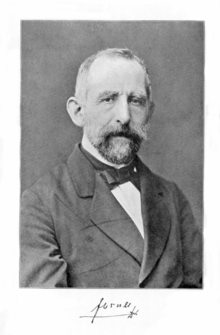Friedrich Crull
Friedrich Georg Ludwig Crull (born October 19, 1822 in Wismar ; † July 4, 1911 there ) was a German doctor, historian and archivist.
Live and act
Friedrich Crull came from a Mecklenburg academic family. He was the son of Wismar's district and city physicist Franz (Georg Friedrich) Crull (born October 29, 1787 in Alt-Karin ; † July 27, 1848 in Wismar) and his wife (since November 25, 1815) Henriette Georgine Franziska, b . von Trützschler (born September 26, 1789 in Jena ; January 28, 1866 in Wismar), grandson of the pastor in Alt-Karin Georg Heinrich Crull (1755–1819) and great-great-grandson of Georg Christoph Detharding .
After attending the large city school in Wismar, he studied medicine, initially at the universities of Jena, Göttingen and Berlin. In November 1846 he was enrolled at the University of Rostock , where he received his doctorate in medicine in 1848 with a dissertation Kollektaneen on the therapy of ovarian water addiction . He then settled as a doctor in his hometown of Wismar and practiced until 1883.
However, Crull made a name for himself more as a homeland and history researcher. In the years 1841 to 1848 he published a few shorter essays on the restoration of the Marienkirche (Wismar) , on the Doberan Minster and on the new building at Kröpeliner Tor in Rostock in newspapers such as the Freimütigen Abendblatt and in the new weekly postal messages and advertisements . From 1850 he became a regular contributor to the Mecklenburg Yearbooks . Medieval architecture, heraldry, genealogy and Wismar's local history were the areas to which he particularly turned. In the 1850s and early 1860s he wrote numerous building descriptions for Mecklenburg churches on the Baltic Sea coast, which, together with the building descriptions from Georg Christian Friedrich Lisch at the same time, aroused a sense of home and responsibility for these buildings in the country and the inventory of Friedrich Schlie's art and historical monuments The Grand Duchy of Mecklenburg-Schwerin paved the way. Many of his articles are cited to this day.
He was an honorary senior of the Association for Mecklenburg History and Archeology and a corresponding member of the Association for Lübeck History and Archeology .
Crull managed the council archives in Wismar on a voluntary basis until 1902, Friedrich Techen , the first full-time archivist, was hired.
Of his children, his son Franz Crull became a district judge in Dargun .
Awards
- 1891 Honorary doctorate from Rostock University
- Gold medal for art and science (Mecklenburg-Schwerin)
- Commander's Cross of the Order of the Griffins
Estate and donations
Crull's written estate, including handwritten records and collections of materials (collections), are now kept in the Wismar City Archives.
During his lifetime he gave the Rostock University Library several books and bequeathed it a medieval legal manuscript from his collection (Mss. Jur. 5).
Fonts
For a complete directory see Friedrich Techen: Directory of the writings of Dr. Friedrich Crull. In: Yearbooks of the Association for Mecklenburg History and Archeology , Vol. 76 (1911), pp. 27–30 ( full text )
- Kollektaneen for the therapy of ovarian hydration. Diss. Rostock 1848
- Digitized copy of the Ghent University Library copy on Google Books
- EE Rath's wine cellar in Wismar. 1868
- The council line of the city of Wismar. Halle: Verlag der Buchhandlung des orphanage 1875 (Hansische Geschistorquellen 2)
- Digitized copy of the copy from the Bavarian State Library
- News of a death dance in Wismar . Bärensprung, Schwerin 1877 ( digitized version )
literature
- Grete Grewolls: Crull, Friedrich Georg Ludwig. In: Who was who in Mecklenburg-Western Pomerania? 1995, p. 89.
- Albert J. Crull: Dr. Amandus Crull of Jefferson County, Missouri: his ancestors, life and times, and descendants. Baltimore: Gateway Press 1992
Web links
- Literature about Friedrich Crull in the state bibliography MV
- Works by Friedrich Crull in the state bibliography MV
Individual evidence
- ↑ Entry in the Rostock matriculation portal
- ^ Kurt Heydeck: The medieval manuscripts of the Rostock University Library. (Catalogs of the Rostock University Library 1) Wiesbaden: Otto Harrassowitz Verlag 2001 ISBN 978-3-447-04327-4 , pp. 31f and 74-78 (description of the ms.).
| personal data | |
|---|---|
| SURNAME | Crull, Friedrich |
| ALTERNATIVE NAMES | Crull, Friedrich Georg Ludwig (full name) |
| BRIEF DESCRIPTION | German doctor, historian, archivist, heraldist |
| DATE OF BIRTH | October 19, 1822 |
| PLACE OF BIRTH | Wismar |
| DATE OF DEATH | 4th July 1911 |
| Place of death | Wismar |
